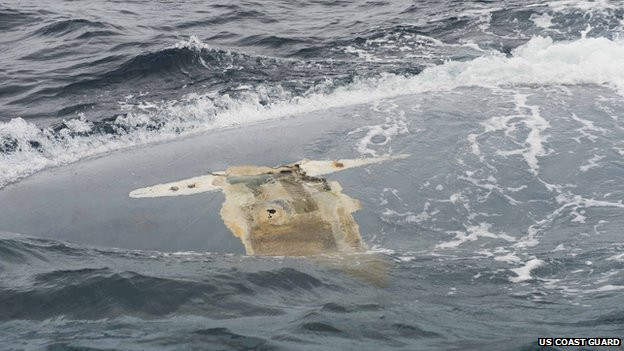Missing British Yachtsmen: Search Abandoned After Unused Lifeboat Found on Cheeki Rafiki

The search for four missing British yachtsmen whose yacht capsized in the Atlantic last week has been called off, after the US Coast Guard found the submerged wreckage with the unused lifeboat still on board.
The search for the missing Brits – whose yacht the Cheeki Rafiki had been missing since 16 May – ended at 3am UK time on Saturday. The US Coast Guard found the capsized boat with the lifeboat still onboard, meaning the men's only realistic means of survival had not been deployed.
The four men - Paul Goslin, 56, from West Camel, Somerset; Steve Warren, 52, from Bridgwater, Somerset; skipper Andrew Bridge, 22, from Farnham, Surrey; and 22-year-old James Male, from Romsey, Hampshire – had been returning to the UK from a regatta in Antigua when the yacht contacted Cheeki Rafiki's owners in Southampton to say they were taking on water and diverting to the Azores.
A US Navy helicopter crew discovered the wreckage about 1,000 miles (1,600km) east of Massachusetts. A Navy boat crew and swimmer identified the yacht and knocked on the hull, but there was no response. The cabin windows had been shattered and the cabin was completely flooded. The yacht's keel was broken, which US Coast Guards said had caused a breach in the hull. There was no sign of the men and there are no further indications as to their whereabouts.
It had already been announced that the search would be called off in the early hours of Saturday if no signs of possible survival were discovered. After the photos emerged confirming the lifeboat was still inside the hull, the Foreign Office announced that a British RAF plane operating from the Azores, which had been due to continue looking for the yachtsmen on Saturday, would no longer be required.
Earlier this week the families had said they were still hopeful their loved ones, who were experienced sailors, had managed to get into the boat's life-raft and were simply awaiting rescue. They had used social media campaigns – with the hashtag #FindOurSailors – and online petitions with more than 200,000 signatures to keep up pressure on the UK, US and Canadian governments to maintain the search of more than 21,000 square miles of ocean.
There are extraordinary tales of survival adfrift at sea in life-rafts. The record-holder is Poon Lim, a Chinese sailor who survived for 133 days on a raft in the south Atlantic after his ship sank in 1942. American author and sailor Steven Callahan survived for 76 days adrift in the Altantic in a life-raft after being hit by a storm while sailing from the Canary Islands to Antigua in 1982. Dougal Robertson and his family spent 38 days in a raft after their schooner was scuppered by whales in 1971.
Experts predicted it would be impossible for the crew to survive outside the life-raft in the rough Atlantic Ocean at a temperature of around 15C. When a person ends up in cold water with no raft, the prospects are considerably grimmer. In these kinds of temperatures survival beyond six hours is extremely unlikely.
© Copyright IBTimes 2025. All rights reserved.





















